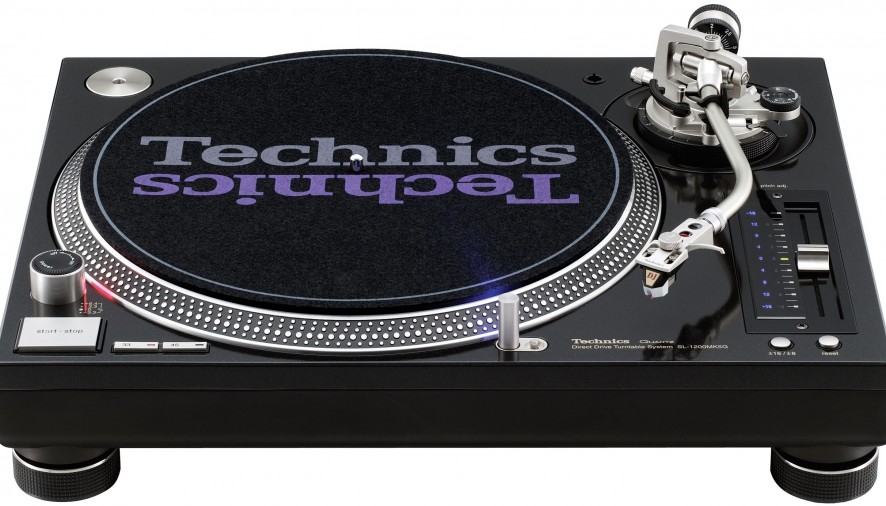“We are sure that retailers and consumers will understand that our product range has to reflect the accelerating transformation of the entire audio market from analogue to digital…”
There it was. The epitaph to an icon. On November 1st, 2010, Panasonic announced that they were to cease production of the iconic Technics 1200 turntable. It was a landmark day, not only for DJ’s but seemingly for the future of the art of DJ’ing itself. The shift from turntables to CDJ’s was now undeniable – the death of the world’s most famous piece of DJ equipment appeared to confirm this. But only six short years and a 27,000 signature petition later, the 1200s are being rereleased in limited ‘Grand Class’ edition form prior to a full release later this year. Whilst this rerelease doesn’t come cheap – expect to pay £3,000 per turntable – the revival of such a key piece of DJ culture alongside rising vinyl sales points towards traditional analogue – format DJ’ing sticking around for years to come, despite some declaring its end not too long ago. But the picture is not completely rosy – the longevity of the new 1200s has got to be brought into question. Fads come and go, and the newest generation of crate-diggers may find this seventh generation of the fabled turntable one step too far.
Any doubts about the future of the Technics must not detract from its illustrious past. Released in 1972 as a turntable for listeners rather than selectors, DJ’s quickly adopted them, with their robustness and reliability becoming famed (they have no rotary belt to break, after all), as well as the ability to control the pitch of a record easily. The first pair arrived on these shores in the late 1970’s, when DJ Froggy (an early pioneer of beatmatching in the UK) imported them from New York after becoming fascinated by the mixing he witnessed at the legendary Paradise Garage discotheque. They went on to become the essential piece of equipment for any DJ or club, and the fact is that you will be hard-pressed in finding a top-level DJ or club that doesn’t swear by them, even today. Local DJ Hamish Cole, a regular at Wire with Butter Side Up summed it up nicely; “I bought my first pair of Technics eight years ago and have used and abused them since. I haven’t had to service them once since and they still work well. The only turntable I’d ever consider using is a pair of Technics”. As a piece of engineering they are a design classic, and a pair even appears in the London Science Museum as one of the objects that has shaped the world we live in.
So, it is clear that no piece of equipment has permeated DJ culture quite like the 1200. However the fact that they are so synonymous with club culture means that they are not exactly hard to come by. Any club worth ruining a pair of trainers for will have a pair, and they make those indestructible Nokia phones everybody used to have seem ephemeral in comparison. Considering this, the release of the latest generation of Technics sticks out as opportunism by Panasonic during this latest vinyl revival, rather than a move to address a gap in the market.
Regardless of what the future holds, the fact is that today the modern appetite for analogue DJing is a miraculous recovery from just a few years ago, when modern equipment saw DJs go from hauling around dozens of records to, in some cases, using only a laptop. The initial cancellation of Technics in 2010 coincided with the DMC World DJ Championships announcing that they were to allow digital vinyl systems such as Sera to for the first time, which only intensified the feelings that DJ culture was changing. Pioneer C DJs were becoming as common in DJ boxes as Technics, and a quick Google search will present numerous opinion pieces predicting the end for the analogue format. Just last year the film ‘We Are Your Friends’ claims in its trailer “if you’re a DJ, all you need is a laptop, some talent, and one track” – a far cry from the classic turntable/mixer combination. Admittedly, yes, a Zac Efron film is hardly a reputable source of insight on DJ culture, but it goes to show how far our views no what constitutes a DJ have changed.
Despite all of this, the analogue format never really went away. Matt Bradshaw, of Leeds’s oldest record shop, Jumbo Records, and a DJ for 24 years, sees the visual appeal of using wax and turntables as important; “Technics are so engrained in DJ culture, and DJ’ing has never got away from the theatrics of using turntables despite how popular CDJ’s or software have become. You can go to watch a DJ and they’ll just crowbar a pair of Technics into their set to keep the image”. This image is not likely to go away any time soon, with vinyl sales rising year-on-year, to the extent that Jumbo has had to find room on their crowded shop floor for yet more records due to customer demand. Bradshaw further sees image as having a part to play here; records allow young people to express their individuality in a concrete way, by having tangible pieces of music rather just a collection of mp3 files. If image really is so important in DJ’ing, then maybe the next generation of Technics will find a new customer base after all. What could look better at a Hyde Park house party than spinning records on a pair of Technics 1200s?
Dan King
Photo credits: The Playground


